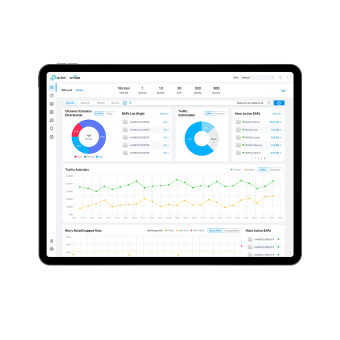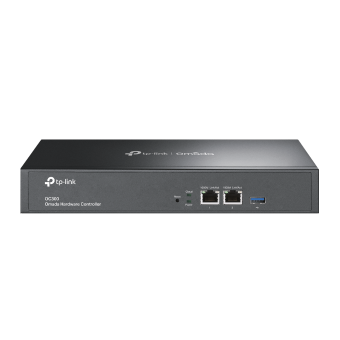Introduction to Omada
Contents
Objective
This article introduces the Omada SDN networking solution.
Requirements
- Omada Cloud-Based Controller / Hardware Controller / Software Controller
- Omada AP / Switch / Gateway
Overview
TP-Link Omada provides one-stop access to high-quality services and high-performance products for small and medium-sized businesses, integrating Controllers, Access Points, Switches, Gateways, and more into a full Software Defined Networking (SDN) solution, providing 100% centralized cloud management to create a highly scalable network—all controlled from a single interface.

Watch the video What is Omada Cloud SDN? to learn more about Omada SDN.
Omada Controller
Omada Controller is a command center and management platform at the heart of the Omada network. There are three types of controllers to choose from: Omada Cloud-Based Controller, Omada Hardware Controller, and Omada Software Controller.
The Omada Cloud-Based Controller is a controller software running entirely in the cloud. It offers zero-touch provisioning for efficient and affordable deployment and provides centralized management of the network wherever you are. There is no additional hardware controller investment and installation on customer premises.

Omada Hardware Controller and Omada Software Controller are on-premises controllers with cloud access, allowing you to control the entire network from anywhere using the Omada App or Web Interface, with no additional service subscription fees. The Omada Software Controller needs to be installed on a PC/Server to manage the whole network, while the Omada Hardware Controller is embedded with the Omada Software Controller and does not require to run a PC or server.

Check out the product page of Omada Cloud-Based Controller, Omada Hardware Controller and Omada Software Controller for more details.
To set up an Omada Controller, please refer to Getting started with an Omada Controller.
Omada Devices
The Omada Controller offers a unified approach to configuring your networks, which are comprised of Omada devices, including APs, Switches, and Gateways:
- Omada APs
Omada AP provides business-class Wi-Fi with superior performance and range, which guarantees reliable wireless connectivity for the Omada SDN network. Check out the product page of Omada APs for more details.
- Omada Switches
Omada Switch offers flexible and cost-effective network solution with powerful Layer 2 features and PoE options. Advanced features such as Access Control, QoS, LAG and Spanning Tree will satisfy advanced business networks. Check out the product page of Omada Switches for more details.
- Omada Gateways
Omada Gateways boasts excellent data processing capabilities and provides highly secure VPN and abundant security features, which are ideal for the business network where a large number of users require a stable, secure connection. Check out the product page of Omada Gateways for more details.
Adopt Devices
Before you can configure and manage Omada devices from an Omada Controller, you need to "adopt" your Omada devices to your Omada Controller. This process connects Omada devices to the Omada Controller for centralized management. For more details, please refer to the guide for Device Adoption.
Omada Cloud Service
The Omada Cloud service provides a better way to achieve remote management. With Cloud Access, you can conveniently monitor and manage your entire Omada network from anywhere, as long as you have access to the internet. You can also manage multiple Omada Controllers with a single TP-Link ID. For more details about the TP-Link ID, please refer to What is TP-Link ID and how to create a TP-Link ID?.
For Omada Cloud-Based Controller, it is naturally accessible through Omada Cloud, simply visit the Omada Cloud portal: https://omada.tplinkcloud.com and log in with your TP-Link ID to bind your controller for cloud management.
For Omada Hardware Controller and Omada Software Controller, the Cloud Access is disabled by default, you need to enable Cloud Access and bind your TP-Link ID on your controller for cloud management. To enable Cloud Access, please refer to How to enable Cloud Access on the Omada Controller.
Omada App
The Omada app offers a convenient way to access the Omada Controller and adopt devices. With the Omada app installed on your iOS or Android device, you can configure settings, monitor the network status, and manage clients, all from a mobile phone or tablet.

The Local Access and Cloud Access features of the Omada app allow you to manage devices both locally and remotely while the controller is running. For more details, please refer to How to add Omada Controller via Omada App.
Get to know more details of each function and configuration please go to Download Center to download the manual of your product.
Is this faq useful?
Your feedback helps improve this site.
TP-Link Community
Still need help? Search for answers, ask questions, and get help from TP-Link experts and other users around the world.










